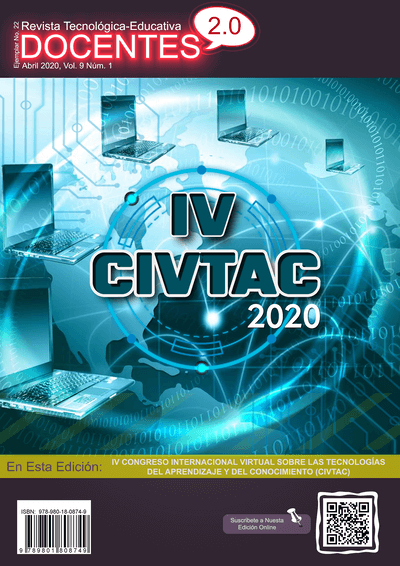E-Learning as a pedagogical strategy in higher education
 DOI:
https://doi.org/10.37843/rted.v9i1.103
DOI:
https://doi.org/10.37843/rted.v9i1.103
Main Article Content
Abstract
Information and communication technologies (ICT) at the present time have taken a leading role in society, which are indispensable in the pedagogical field. This research was carried out in the educational platform Teachers 2.0, in order to propose recommendations to promote the platform. In the methodology, indicators of the E-Learning platform were defined in three dimensions: organizational, functional and pedagogical. In addition, historical records were analyzed in the databases of the platform. Through this research, a low rate of use of E-Learning platforms by teachers was detected, however, there was a total acceptance of existing platforms by their users.
Downloads
Metrics
Article Details

This work is licensed under a Creative Commons Attribution-NonCommercial-NoDerivatives 4.0 International License.
Those authors who have publications in our journal accept the following terms:
- When a work is accepted for publication, the author retains rights of reproduction, distribution of his/her article for exploitation in all countries of the world in the format provided by our magazine and any other magnetic medium, optical, and digital.
- Authors will retain their copyright and guarantee the journal the right first to publish their work, which will be simultaneously subject to the Creative Commons Acknowledgment License (Attribution-NonCommercial-NoDerivatives 4.0 International (CC BY-NC-ND 4.0)). That allows third parties to copy and redistribute the material in any medium or format, under the following conditions: Acknowledgment - You must properly acknowledge authorship, provide a link to the license, and indicate if any changes have been made. You may do so in any reasonable way, but not in a way that suggests you have the licensor's endorsement or receive it for your use. NonCommercial - You may not use the material for a commercial purpose. NoDerivatives - If you remix, transform, or build from the material, you cannot broadcast the modified material. There are no additional restrictions - You cannot apply legal terms or technological measures that legally restrict you from doing what the license allows.
- Authors may adopt other non-exclusive license agreements to distribute the published version of the work (e.g., deposit it in an institutional archive or publish it in a monographic volume) provided that the initial publication in this journal is indicated.
- Authors are allowed and recommended to disseminate their work through the Internet (e.g., in institutional telematic archives, repositories, libraries, or their website), producing exciting exchanges and increasing the published work's citations.
- Request of withdrawal an article has to be done in writing by the author to the Editor, becoming effective after a written response from the Editor. For this purpose, the author or authors will send correspondence via e-mail: [email protected].
- The author will not receive financial compensation for the publication of his work.
- All Docentes 2.0 Journal publications are under the Open Journal System (OJS) platform at: https://ojs.docentes20.com/.
References
Alsabawy, A., Cater-Steel, A. & Soar, J. (2013). IT infrastructure services as a requirement for E-Learning system success. Computers & Education.
Alfirevic, N., Cukusic, M., Granic, A., & Garaca, Z. (2010). E-Learning process management and the E-Learning performance: Result of a European empirical study. Computers & Education.
Álvarez, L. (2012). Sistema de Gestión de Aprendizaje. http://es.scribd.com/doc/100356593/3-Sistemas-de- Gestion-de-Aprendizaje-v21.
Barbier, M., Faulx, D., Hansez, I. & Peters, S. (2012) Learning and motivation to transfer after an E-Learning program: impact of trainees’ motivation to train, personal interaction and satisfaction. Innovations in Education and Teaching International.
Bernardo, A., Cerezo, R., Núñez, J., Rodríguez, S., Rosario, P. & Valle, A. (2010). New media for the promotion of self-regulated learning in higher education. 22 (2), 306-315. Psicothema,
Castro, S., Clarenc, C. A., López de Lenz, C., Moreno, M. & Tosco, N. B. (2013). Analizamos 19 plataformas de e- Learning: Investigación colaborativa sobre LMS. https://es.scribd.com/doc/191191138/Analizamos-19-plataformas-de-eLearning-primera-investigacion-academica-colaborativa-mundial.
Ceinos, C., García, R. y Sobrado, L. M. (2012). Utilización de las TIC en orientación profesional: Experiencias innovadoras. Revista Mexicana de Orientación Educativa, 9 (23), 2-10.
Darzentas, J. Koutsabasis, P., Stavrakis, M., Spyrou, T. & (2011). Perceived Impact of Asynchronous E-Learning After Long-Term Use: Implications for Design and Development. International Journal of Human-Computer Interaction.
Deveci, A. (2016). Examination of University Students’ Level of Satisfaction and Readiness for E-Courses and the Relationship between Them. European Journal of Contemporary Education.
Echeverría, S., Gallardo, S. A., Loría, J., Monroy, L. E., & Palacios, N. (2010). Estrategia educativa en línea durante el brote de la influencia A H1N1. Revista médica del IMSS.
Fell, P. & Reynolds, S. (2011). The effect of E-Learning on student placement in the community. Primary Health Care, 21 (5), 28-32.
García-Valcarcél, A. (Coord.) (2011). Integración de las TIC en la Docencia Universitaria. La Coruña. Netbiblo.
Gatica, F. & Rosales, A. (2012). E-Learning en la educación médica. Revista de la Facultad de Medicina de la UNAM 55 (2), 27-37.
Guzmán, C., Imbernón, F. & Silva, P. (2011). Competencias en los procesos de enseñanza-aprendizaje virtual y semipresencial. Comunicar.
Marshall, S. (2012). Improving the quality of E-Learning: lessons from the eMM. Journal of Computer Assisted Learning, 28(1), 65-78.
Orozco, H. (2013). Claves para una integración equilibrada de los usos de las TIC en el proceso de enseñanza-aprendizaje. Revista Cultura de Guatemala.
Sozcu, O. F. & Ipek, I. (2013). Consideration for IEL Courseware Design and the Next Generation of E-learning. European Journal of Contemporary Education.






